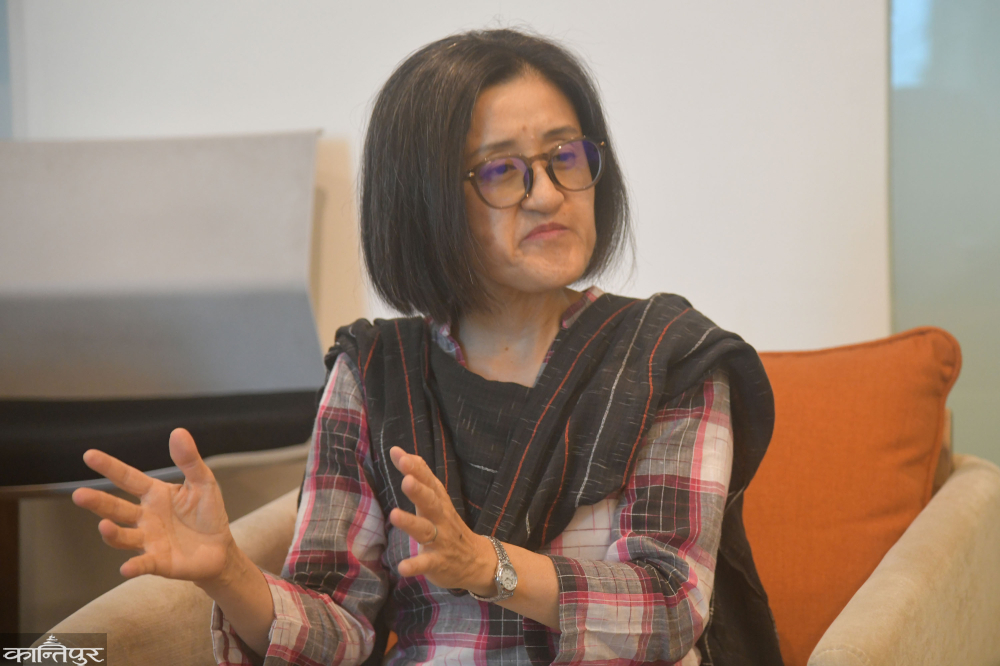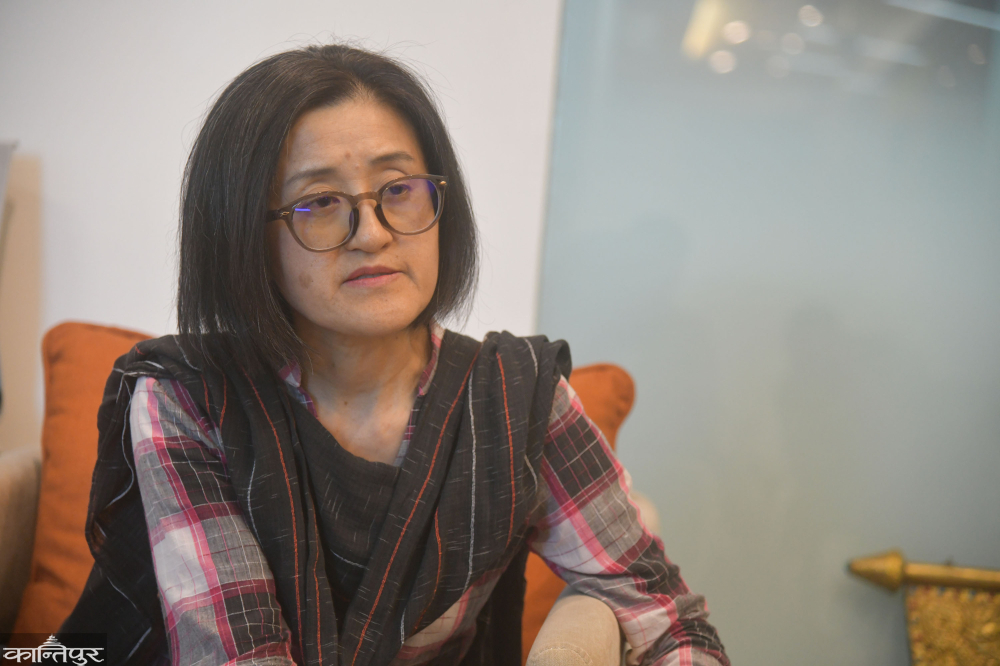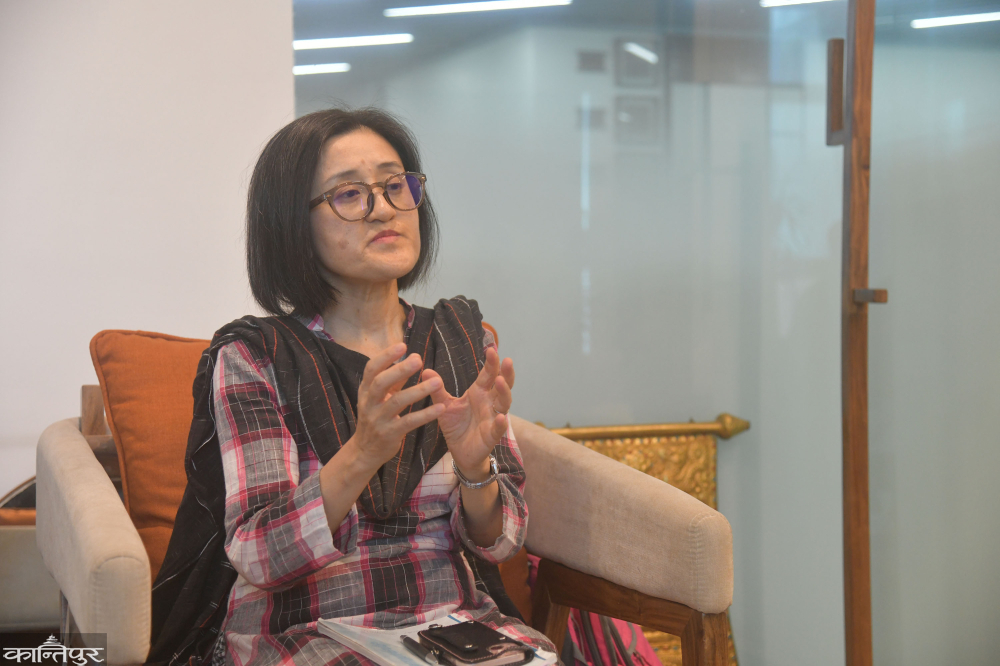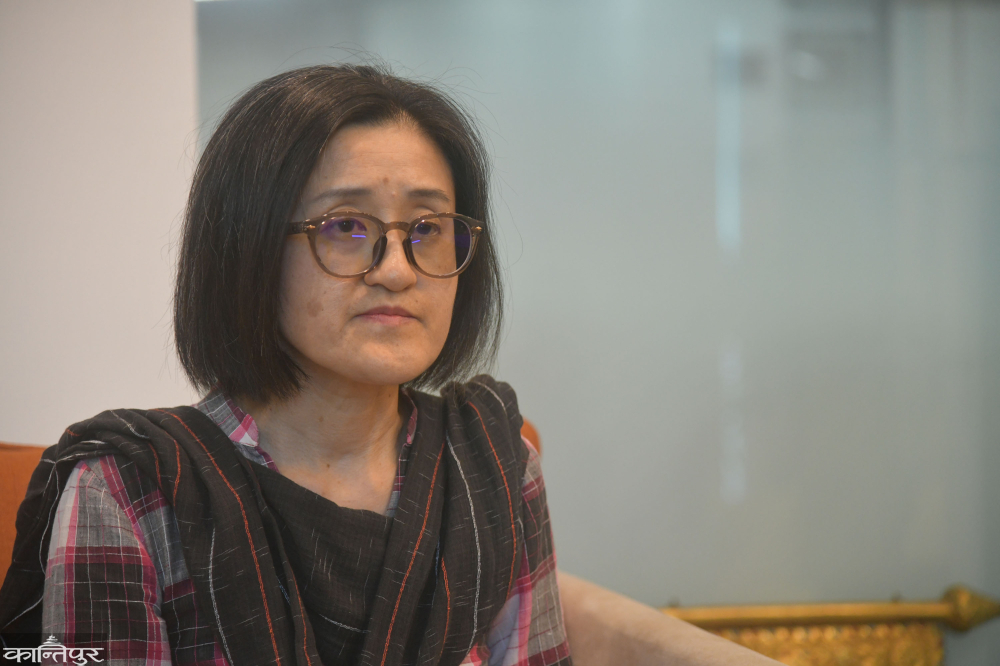"After reaching a point, the tendency to leave the country will change, the number of people returning to the country will increase"

We use Google Cloud Translation Services. Google requires we provide the following disclaimer relating to use of this service:
This service may contain translations powered by Google. Google disclaims all warranties related to the translations, expressed or implied, including any warranties of accuracy, reliability, and any implied warranties of merchantability, fitness for a particular purpose, and noninfringement.

Highlights
- "Thirty years ago, there was not much practice of going abroad in Nepal. As soon as he saw a new person, he would ask questions like where did he come from and what did he do.
- "Now not only in Nepal, people all over the world only watch mobile phones. There is no public dialogue.
- The youth of Nepal seem to want to go out and do something good. I think that is good.



Professor Masako Tanaka, who graduated from Nihon Fukushi University in Japan, currently teaches development studies, international cooperation, gender and South Asia at Sophia University in Japan.

In addition to the Japan International Cooperation Agency (JICA), she has worked in Nepal, Bangladesh and Ghana. She has studied and researched about the development of Nepali society, gender situation and immigration for the last thirty years.
Janakraj Sapkota from Kantipur and Kishore Dahal edited part of the conversation with Masako, who is also persistent in advocating for the rights of the Nepali community in Japan, about her understanding of Nepali society, the situation of Nepali immigrants in Japan, and other issues: break What was Kathmandu like when you first came to Nepal 30 years ago?
I came to Nepal for the first time in 1995. After that I am going back and forth. At that time, there were not many 'private' vehicles like now. A blue or black tampo was used. People were friendly. I was able to learn Nepali language while sitting in the public car and talking.
Thirty years ago, there was not much practice of going abroad in Nepal. As soon as he saw a new person, he would ask questions like where did he come from and what did he do. I used to see people talking a lot not only to me but also to each other. Now not only in Nepal, people all over the world only watch mobile. There is no public dialogue.
You have been coming to Nepal for a few years. What changes have you seen in Nepal during 30 years?
I see many changes in women's rights. Because the laws of Nepal are much better than those of Japan regarding women's rights. In Nepal, I see that women are leading the media and business sectors. There has been a lot of development of women at the leadership level.
You also worked with the Japan International Cooperation Agency (JICA) in Nepal, Bangladesh and Ghana. What was the difference between working in Nepal and other countries?
I worked in Nepal for the longest time. That is why I can say how much progress has been made in Nepal. But where I have worked other than Nepal, it is difficult to compare with Nepal because the history and problems of those countries are different. But I am very happy to see the progress made by Nepal in thirty years.
What do you think has been the most progress in Nepal?
The internal and external 'mobility' of people in Nepal is very high. When it comes to politics, not much has changed since World War II. Japan's politics seem to be stable. Young people feel a little more hopeless. But our youth in Japan do not want to go out to find more. But the youth of Nepal seem to want to go out and do something good. In this way, going out to find something can also be called a kind of 'energetic' thinking. That sounds good to me.
Until a few years ago, the number of students going to Australia and Canada was very high. Now Japan is number one. About 35,000 students went to Japan in the last financial year alone. Why do you think so many students are going to Japan?
There are two reasons for that. One, Australia or Canada is discouraging migration after the Covid pandemic. Especially, Canada is taking more of this policy. In Japan, there seems to be a shortage of working manpower. That's why Japan is welcoming young people from outside, regardless of what type of people they are.
In Japan, there are currently two types of visas, the visa under the Technical Intern Training Program and the Specified Skilled Worker (SAW) given to those with special abilities. This is a work visa. There are many types of exams for this. You can't even choose where to go and what to do. Next up are those who go on student visas. Those on student visas have it a little easier. Because of that, the number of people going on student visas may have increased.
 There is also an understanding that even if Nepali students go to study, they will work. You also keep in touch with many Nepalese students in Japan. What is the situation of Nepali students?
There is also an understanding that even if Nepali students go to study, they will work. You also keep in touch with many Nepalese students in Japan. What is the situation of Nepali students?
I am interacting with a Nepali student. Whatever their initial 'motivation' is, who they meet and what experience they get once there makes a big difference. For example, people who initially went for work are also found to be in good company and have a masters degree or PhD. And there are also people who quit their studies in the middle because they didn't get good company even though they went to study for a degree. So what kind of opportunities and company they get after going to Japan makes a lot of difference.
It is heard that Nepali people are suffering by not knowing the language or methodology there, relying on the false things said by some consultancy. Does that happen?
indeed.
What are the most difficult things for Nepalese?
Not only Japan, information about all destinations is now available on the website. If you are a little cautious and understand through it, you will know whether the information given to you is correct or not. But without doing so, only believing that others have 'manipulated' them has led to problems.
You said some time ago while narrating the conclusion of the study - Nepali people spend more money in Japan learning Japanese than the support provided by Japan. Is the situation still the same?
will be the same now. Because the foreign aid coming to Nepal from Japan is not as much as before. But the number of people passing through here is increasing. There are also those who pay a lot of money. First on a student visa and now on another worker visa. Either way, money will be spent. Those who take the Japanese language exam do not pay a lump sum, but spend an estimated 40 million Nepalese rupees on school fees.
Nepalis go to Japan by paying so much money. They spend millions again on language tests and other studies. Can Nepalese earn that much money by working? They can't do that
.
is still going? Why?
A common characteristic of immigrants is that they do not return home until they are successful. The definition of success is also much bigger for people living in Nepal than for people who have gone abroad. While searching for that success, the debt may be too much and may not be returned. Some of them are also suffering from mental problems.
 Some students are facing many kinds of problems by not being able to cope with the pressure of work and study. It is heard that female students of Nepal also have many kinds of problems. You have also studied such subjects. What does it look like? If the
Some students are facing many kinds of problems by not being able to cope with the pressure of work and study. It is heard that female students of Nepal also have many kinds of problems. You have also studied such subjects. What does it look like? If the
cannot solve the problem by itself, it has to rely on others. In such a situation, there are many cases of unwanted pregnancy among Nepali students while living together. It is also heard that some of them had abortions for this reason and committed suicide after the situation worsened.
You have also recently completed a study on access to contraceptives among Nepalis in Japan. What did this study show?
Abortion is now free in Nepal. It is probably the country with the most availability of family planning tools in the world. But in Japan, there are very few such options. Health insurance is also not exempt.
For example, an abortion in Japan costs at least one lakh rupees. But in Nepal, some things are free at government health posts. That is why it is very difficult to think that it will be like in Japan in Nepal. In Japan, pills cost 2/3 thousand rupees. That's why some Nepalese carry pills from Nepal.
 How do you see the situation of Nepali female students and Nepali women living on dependent visa?
How do you see the situation of Nepali female students and Nepali women living on dependent visa?
There are two groups in Japan: Nepali women students and wives who have gone on dependent visas. The students themselves are learning Japanese, so they don't seem to be in too much trouble. But some women who went on dependent visas have directly reached Tokyo from the village. They work in places where most of them do not have to communicate because of language problems. Like, arranging beds and seats in hotels, cleaning work. What are their labor rights? I don't even know what the rules are in Japan. Those who go through agents are also in trouble. But I see that people from the family are also getting into trouble.
The number of Nepalis in Japan is large. How do you see the progress of Nepalis as Japanese citizens?
Now the number of Nepalis in Japan has reached 200,000. 10 percent of them are children under the age of 18. Some Nepalis who have progressed have their own business. Some are even teachers or professors. Two years ago, I also went to research about the Nepali community in New York.
What surprised me about that research was that the same people who lived in Japan before moved to New York. This means that if people reach a new place, their desire will increase more and more. Therefore, even if they are successful in Tokyo, they are going to America saying that it is not enough. In Japan, the Japanese were the majority and foreign immigrants were the minority, while New York itself is like a city of immigrants, so it is very easy for Nepalis there.
The third generation of Nepalis is now growing up in Japan. Are there any differences in professional skills, competencies or earnings between the first and third generations?
is different. It is also seen that the people who came on cook visa around 1990 returned to their country because their father, mother or grandparents were in Nepal. Or, it is also seen that they go back and forth to both Nepal and Japan. Although the second generation has a restaurant in the Bahamas, it seems that they will have to go to another profession because they will not get a cook visa. The children of those working on cook visas have studied at university and high school in Japan, so it seems that they are working for that company.
A large number of Nepalis in Japan are in the restaurant sector, right? is a
. However, the number of people entering Japanese companies on student visas is gradually increasing. Around 2004, the number of Nepalis going on cook visa was large. However, now more than 60 percent go on student visas. The second is those who go on a dependent visa. The number of people switching from student visa to worker visa is also increasing now. Therefore, it seems that the number of Nepali living on cook visa is decreasing.
Vijay Gyawali, who has returned from Japan, has written a book- 'Cheese Naan'. The book mentions the fact that Nepalis are being exploited in Nepali restaurants in Japan. Is the situation still the same?
Such trend is now decreasing. I also translated Vijayji's book into Japanese. Perhaps even Japanese immigration officers read that book. So now the rules have been made very strict. Now it is difficult to get a cook's visa. That is why Indians work in Nepali restaurants wearing Nepali caps. Because it is difficult for new people to get a visa from Nepal. Nepali restaurants have many problems. According to Japanese law, there is a big difference between what is written on the paper and their reality.
as in the contract it is mentioned to get 3 lakh 50 thousand per month. But the worker does not seem to have received even one lakh in cash. Due to this situation, there are problems with things like health insurance, taxes. There is one problem on paper and the salary is another. The Japanese government has introduced a rule that no permanent residence permit can be obtained without paying all taxes and health insurance in the last 5 years. So many people are also trying to go to Europe or America to see if I can get a permanent residence permit.
 You teach development studies, international cooperation, gender and South Asia at Sofia University. You have also observed the development of Nepal. What is the development speed of Nepal?
You teach development studies, international cooperation, gender and South Asia at Sofia University. You have also observed the development of Nepal. What is the development speed of Nepal?
Development is not just building bridges or buildings. It is also to make people. It seems that the government of Nepal is a bit irresponsible when it comes to making people. Because remittances generate a lot of income. But the children of Nepalis living abroad are not benefited from remittances. This time, I have come to study the mother tongue education of Nepalis who have returned from foreign employment. Other countries have made good use of remittances for local development.
In addition, immigrants from Indonesia, Vietnam are also spending on mother tongue education. These countries are very receptive to remittances. According to that, they have also given a lot of rewards to the immigrants. That is why immigrants also have a lot of love for their country. Looking at the current situation in Nepal, many buildings have been built here. I never thought that so many buildings would be built in thirty years. But what do you get when you think about who lives in these buildings?
It doesn't seem like the government has invested so much in the progress of people. Development should not only focus on hardware, but also on software. For this, the state should also invest in the education of the next generation, who are living outside.
 Currently, 2,000 to 2,200 Nepalis are leaving Nepal every day. As you say, is it good in terms of mobility or a loss for the country?
Currently, 2,000 to 2,200 Nepalis are leaving Nepal every day. As you say, is it good in terms of mobility or a loss for the country?
If you look at the history of the world, there is not a single example where all the people left the country and that country was closed. Now the Nepalese say, who lives in Nepal? Everyone leaves. But looking at history, there is no such country. I think that after reaching the highest point, the tendency to leave the country will change and the number of people returning to the country will increase. Japan was also a country of out-migration before World War II.
It was customary to go from Japan to Brazil, America for employment. Korea was a similar country. But both Japan and Korea have now become countries that hire workers from abroad. Therefore, it cannot be said that all the people from Nepal will go abroad and the country will be empty. But what matters is how fast or slow the return from abroad is. What is the 'peak point' of immigration? The state should increase investment in social security and health security within Nepal.
 प्रकाशित : भाद्र ३०, २०८१ ०९:२२
प्रकाशित : भाद्र ३०, २०८१ ०९:२२

 २३.१२°C काठमाडौं
२३.१२°C काठमाडौं










